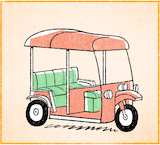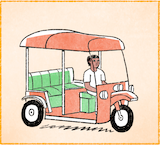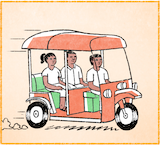


อันนี้คืออี่หยัง อันนี้เป็นลดสามล้อ หลือว่าลดตุ่กตุ่ก
ลดสามล้อหนิ[กับ]ลดตุ่กตุ่กคือกันบ่ กะค้ายๆ กันหนิหละ กะคือกันอยู่ บ่แตกต่างกันหลาย ใซ้งานได้คือกัน
แล้วลดตุ่กตุ่กกับลดสามล้อหนิใซ้งานจั่งใด กะเอาไว้ถ้าขับ กะเอาไว้ถ้าขี่ไปหนั้นไปหนี้ คือกันกับลดใหญ่ คือกันกับลดพิกอั่บหนั้นหละ แต่ว่ามันขี่ได้เล็วบ่หลาย ขี่ได้ซ้าๆ ขี่ได้ส่ำกับลดมอเตอไซหลือว่าซ้ากว่ามอเตอไซอยู่ แต่ว่าขี่ได้บ่เล็วหลาย แต่ว่าสามาดขี่ไปหนั้นไปหนี้ได้ สะดวกคือกัน ส่ำลดใหญ่หนั้นหละเนาะ
แล้วอยู่ในกุงเทบกะมีลดตุ่กตุ่กหลายคือกัน เอามาใซ้เป็นยานพาหะนะหลือว่าลดลับส่งนั้นเอง ค้ายๆ กับลดแท็กซี้เนาะ ใซ้งานคือกันกับลดแท็กซี้ แบบว่า ลับพุโดยสานไปส่งหม้องหั้นหม้องหนี้ กะค้ายๆ กับลดแท็กซี้
2
เขากำลังเฮ็ดหญัง กะมีพุซายพุหนึ่ง เขากำลังขับลดตุ่กตุ่กหลือว่าลดสามล้ออยู่
เขาสิขับลดอันนี้ไปใส กะบ่ฮู้คือกัน อาดสิขับไปตะหลาดตะลี หลือว่าไปซื้อของกะได้
แต่ว่าในบางเที่ย ขั้นพุซายคนนี้ขับลดตุ่กตุ่ก หลือว่าเขาสิเป็นคนขับตุ่กตุ่กลับจ้าง เขากะอาดสิไปลับพุโดยสาน หลือว่าไปหม้องหั้นไปหม้องหนี้ เพื่อที่สิไปลับไปหาพุโดยสานนั้นเองเนาะ
3
เขากำลังเฮ็ดหญัง กะมีพุซายพุหนึ่ง กำลังขับลดตุ่กตุ่กอยู่หนั้นหละ
แล้วเขาสิขับไปใส จักคือกัน บ่ฮู้ว่าเขาสิขับไปใส แต่ว่าตอนนี้แนมเห็นคนสองคนอยู่ข้างหลังของเขา หลือว่าเขากำลังบันทุกพุโดยสาน ไปส่งหม้องหนั้นหม้องหนี้ อาดสิไปส่งพุโดยสานกะได้ เพาะว่าเห็นพุหญิงกับพุซายสองคนนั่งอยู่ข้างหลัง
แล้วลดตุ่กตุ่กนี้มันบันจุคนได้หลายคนบ่ หลือว่าคนไปนั่งเทิงลดตุ่กตุ่กหนิได้หลายคนบ่ กะบ่หลายปานใด คนกะนั่งอยู่เทิงลดตุ่กตุ่กได้บ่ส่ำลดเก็งหลือว่าบ่ส่ำลดพิกอั่บเนาะ เพาะว่าพื้นที้มันบ่หลาย มีพื้นที้น้อยๆ หนึ่ง เพาะว่าลดตุ่กตุ่กมันกะมีแค่สามล้อ หม้องนั่งนี้กะสิมีหม้องนั่งคนขับแล้วกะหม้องนั่งพุซ้อนนั้นเอง กะคือได้ปะมานสองสามคน สี่คน ปะมานนั้น อย่างหลายเนาะ
Link to overview page
Link to dictionary
| Isaan | Pronunciation | Tones | Thai | English/Notes |
|---|---|---|---|---|
| อัน | an | M | อัน | 1. thing, object 2. general clf. for objects |
| นี้ | ni: | HF | นี้ | 1. this 2. here |
| คือ | khʉ: | HR | คือ | 1. to be, to resemble, like, as 2. why {บักหล้าคือบ่เก็บโต่ะแน่ = [addressing a young boy] Why haven't you cleared the table?} |
| อี่หยัง | i:-yaŋ | H-M | อะไร | 1. what {นี้คืออี่หยัง = What is this?} {มื้อนี้เจ้าเฮ็ดอี่หยัง = What are you doing today?} {กินเข้างายกับอี่หยัง = What did you have for breakfast?} 2. something, anything, (in negations) nothing {บ่ต้องเฮ็ดอี่หยังอีกเลยนอกจากใส่ปุย = [we] don't need to do anything besides adding fertilizer} |
| เป็น | pen | M | เป็น | 1. to be, to exist 2. to be able to 3. to suffer, sth. happens to 4. เป็นหญัง[...]คือ in initial position: why? {เป็นหญังเขากะคือแปงฟัน = Why is he brushing his teeth?} {เป็นหญังเคี่ยงบินมันคือสิตก = Why is the airplane falling down?} |
| ลดสามล้อ | lot-sa:m-lɔ: | H-M-HF | รถสามล้อ, ตุ๊กตุ๊ก | tuk tuk, tricycle, three-wheeled vehicle |
| หลือ | lʉ: | M | หรือ | or |
| ว่า | wa: | H | ว่า | 1. that, as {คำว่า X = the word X} 2. to say |
| ลดตุ่กตุ่ก | lot-tuk-tuk | H-H-H | ตุ๊กตุ๊ก | tuk tuk, tricycle, three-wheeled vehicle |
| หนิ | ni | M | นี่แหละ, เหรอ/หรอ | 1. particle used to emphasize a statement or form (or add to) a question {เป็นตาแซบคือหญังหนิ = it's really tasty} {เคี่ยงพอเท่าๆ หนิ = the [radio] is appropriately sized (i.e., not too large)} 2. variant of นี้ = this Notes: translation to be determined; maybe sometimes like Thai นี่แหละ; other examples given: อยู่ใสหนิ อยู่ตลาดหนิ กินเข้าไป่หนิ |
| กับ | gap | M | กับ | 1. and {ลุงกับป้า = uncle and aunt} {กวยเตียวหมูกับกวยเตียวไก่ = noodle soup with pork and noodle soup with chicken} 2. with, to {ค้ายๆ กับคำว่า ... = similar to the word ...} 3. prefix in front of foods {กับเข้า = side dishes eaten with rice} {เขากินกับกวยเตียว = he's eating noodle soup} |
| คือกัน | khʉ:-gan | HR-M | เหมือนกัน | 1. also, likewise, similarly {ยินดีที่ได้ฮู้จักคือกันคับ = Nice to meet you too!} 2. in negative sentences: either {บ่ลู้คือกัน = I don't know either} {จักคือกัน = I don't know (either)} |
| บ่ | bɔ: | H | ไม่ | 1. no, not 2. question particle, transforming a statement into a question Notes: spelling exception in line with common usage on social media |
| กะ | ga | M | ก็ | 1. then, consequently 2. also |
| ค้าย | kha:i | HF | คล้าย | to resemble, to be similar, to be alike {ทัพพีเป็นค้ายๆ กับซ้อน = a ladle is similar to a spoon} |
| กัน | gan | M | กัน | mutual, each other, with another, together {เขากำลังนั่งเว้ากัน = they're sitting and talking} {เขาสองคนฮักกัน = they love each other} {ปาสองโตนี้ ใหญ่ห่างกันหลายบ่ = These two fish here, are they very different in size (from each other)?} {ต่างกัน = to be different (from each other)} {ก่องอันไหนหนักกว่ากัน = Which box is heavier (than the other(s))?} |
| หนิหละ | ni-la | M-M | นี่แหละ | auxiliary for emphasis at the end of a phrase Notes: variant of นี้หละ |
| อยู่ | yu: | H | อยู่ | 1. to be (located) at 2. yet, still 3. auxiliary indicating continuous or progressive action {ทอดปาอยู่ในกะทะ = (in the process of) frying a fish in the pan} {แม่กำลังเมี้ยนเฮียนอยู่ = mother is cleaning/tidying up the house} |
| แตกต่าง | tɛ:k-ta:ŋ | LF-H | แตกต่าง | different, dissimilar |
| หลาย | la:i | M | เยอะ, มาก | many, much, very |
| ใซ้งาน | sai-ŋa:n | HF-HR | ใช้งาน | to use, to put to use |
| ได้ | dai | HF | ได้ | 1. can 2. to get, to obtain 3. before verb: indicating past tense 4. บ่ได้ + verb: not |
| แล้ว | lɛ:o | HF | แล้ว | 1. finished 2. already 3. and then, and next (especially แล้วกะ) 4. auxiliary for past tense |
| จั่งใด | jaŋ-dai | H-M | ยังไง, แบบไหน | how, in what manner {บักนาวมันมีลดซาดจั่งใด = Lime fruits have what kind of taste?} {เขาปิดแอจั่งใด = How is he switching off the A/C?} {เทียนใซ้จั่งใด = How's a candle used?} {สิใซ้จั่งใด = how is [it] used?} |
| เอา | ao | M | เอา | to take, to give {เขากำลังเอาก่องไปซั่ง = he's taking the boxes to weigh them} {หมอกำลังเอายาให้คนป่วยกิน = the doctor is giving medicine to the patient} {เอาไว้ถ้า = is for, is used for, has the purpose of} |
| ไว้ถ้า | wai-tha: | HF-LF | usually in a positive statement or answer: is for, is used for, has the purpose of {กะทะมีไว้ถ้าทอด = a pan is for frying} {น้ำบักนาวมีไว้ถ้าปุงอาหาน = lime juice is used to season food} {ปากกามีไว้ถ้าเขียน = a pen is for writing} {กะเทียมเอาไว้ถ้าเฮ็ดแนวกิน = garlic is used to make food} {ขาเอาไว้ถ้าญ่าง = legs are for walking} {เกิบเอาไว้ถ้าใส่ = shoes are for wearing} Notes: see also ไว้ |
|
| ขับ | khap | M | ขับ | to drive, to ride |
| ขี่ | khi: | H | ขี่ | to ride, to drive {ขี่มอเตอไซ = to ride a motorbike} {ขี่ควย = to ride on a buffalo} {ขี่เลีย = to take or travel on a boat} |
| ไป | pai | M | ไป | 1. to go 2. auxiliary indicating action extending into the future |
| หนั้น | nan | LF | นั้น | that, there Notes: possibly a variant of นั้น or หั้น |
| หนี้ | ni: | LF | นี่ | here |
| ลด | lot | H | รถ | 1. car, motorized vehicle 2. vehicle, cart {ลดขายแนวกิน = food cart} |
| ใหญ่ | ɲai | H | ใหญ่ | large, big |
| ลดพิกอั่บ | lot-phik-ap | H-H-H | รถพิกอัป, รถกระบะ | pick-up truck |
| หนั้นหละ | nan-la | LF-M | นั่นแหละ | auxiliary for emphasis at the end of a phrase Notes: possibly a variant of นั้นหละ |
| แต่ว่า | tɛ:-wa: | H-H | แต่ว่า | 1. but 2. only {ฮู้แต่ว่าเขายืนอยู่พุเดียว = I only know that he's standing there by himself} |
| มัน | man | HR | มัน | it (also used to refer to people) |
| เล็ว | leo | HR | เร็ว | fast, quick |
| ซ้า | sa: | HF | ช้า | 1. slow 2. late, delayed |
| ส่ำ | sam | H | 1. what size?, what shape? {พุหญิงคนนี้ผมญาวส่ำใด = How long is this woman's hair?} 2. equal to (in size), as large as {โตบักใหญ่หนึ่ง โตส่ำกะทะเอาโลด = a large [fish], filling the whole pan} {อายุส่ำกัน = to be of the same age} {[หนังสือพิม]สิมีข้อมูนบ่หลายส่ำหนังสือ = [a newspaper] doesn't have as much information as a book} |
|
| มอเตอไซ | mɔ:-tə:-sai | HR-M-HR | มอเตอร์ไซค์ | motorbike |
| กว่า | gwa: | H | กว่า | more, more than, comparative: as, than |
| สามาด | sa:-ma:t | M-HF | สามารถ | can, to be able |
| สะดวก | sa-du:ak | M-LF | สะดวก | convenient |
| เนาะ | nɔ | H | เนาะ | final particle: makes the statement softer, looking for agreement |
| ใน | nai | HR | ใน | in, within |
| กุงเทบ | guŋ-the:p | M-HF | กรุงเทพ | Bangkok |
| มี | mi: | HR | มี | 1. to have 2. there is |
| มา | ma: | HR | มา | 1. to come 2. auxiliary expressing action towards the present or focal time {กะคุเฮ็ดมาจากอี่หยัง = What is the bucket made of?} {แล้วเขากะเก็บเงินจากพุนั้นมา = and then she takes the money of that person} |
| ใซ้ | sai | HF | ใช้ | to use |
| ยานพาหะนะ | ya:n-pha:-ha-na | M-HR-M-H | ยานพาหนะ | vehicle, means of transport |
| ลดลับส่ง | lot-lap-soŋ | H-H-H | รถรับส่ง | shuttle bus |
| นั้นเอง | nan-e:ŋ | HF-M | นั่นเอง | 1. there 2. sure enough 3. emphasizes that the preceding is the topic or has been mentioned before Notes: Thai loan |
| ลดแท็กซี้ | lot-thɛk-si: | H-H-HF | รถแท็กซี่ | taxi |
| แบบ | bɛ:p | LF | แบบ | 1. example, model, kind 2. style, form, pattern, design |
| ลับ | lap | H | รับ | 1. phone: to answer a call 2. to receive, accept, pick up, take up Notes: see also ฮับ |
| พุโดยสาน | phu-do:i-sa:n | H-M-M | ผู้โดยสาร | passenger |
| ส่ง | soŋ | H | ส่ง | 1. to send 2. to give, to hand sth. (over), to pass 3. to bring so., e.g., to their destination {ลดปะจำทางคันนี้สิแล่นไปส่งพุโดยสาน = the bus brings the passengers to their destinations} 4. to emit (e.g., a smell, noise) {ส่งเสียง = to make a noise} |
| หม้อง | mɔŋ | LF | ที่, แห่ง, บริเวณ | 1. place, area {หลายที่หลายหม้อง = in many places} {หม้องใดหม้องหนึ่ง = some place} 2. clf. for places |
| หั้น | han | LF | ที่นั่น | there, over there |
| เขา | khao | M | เขา | personal pronoun: he, she |
| กำลัง | gam-laŋ | M-HR | กำลัง | auxiliary indicating continuous or progressive action |
| เฮ็ด | het | H | ทำ | to do, to make |
| หญัง | ɲaŋ | M | อะไร, เป็นหญัง = ทำไม | 1. what {เขากำลังเฮ็ดหญัง = What is he doing?} {ธูปเอาไว้เฮ็ดหญัง = What are incense sticks for?} 2. something, anything, (nothing) 3. เป็นหญัง[...]คือ in initial position: why {เป็นหญังเขาคือใส่บักพิกลงไปในกวยเตียว = Why is he putting chili in [his] noodle soup?} {เป็นหญังหน้าต่างมันคือเปิด = Why is the window open?} {เป็นหญังมันคือมีควนไฟ = Why is there smoke?} |
| พุซาย | phu-sa:i | H-HR | ผู้ชาย | man, male |
| พุ | phu | H | ผู้ | 1. person 2. clf. for people {พุหญิงพุหนึ่ง พุซายพุหนึ่ง = a woman, a man} {ซู่พุซู่คน = everybody} {พุหนึ่งโตจ่อยๆ พุหนึ่งโตบักอ้วนหนึ่ง = one person is slim, the other is fat} Notes: pronunciation: also realized as พู่- |
| หนึ่ง | nʉŋ | H | หนึ่ง | 1. one 2. after adjective: intensifier {บักคักหนึ่ง = very much} {อันบักใหญ่หนึ่ง = very large}, or attenuates the meaning {กะดาดมันแผ่นน้อยๆ หนึ่ง = the piece of paper is [relatively] small} |
| สิ | si | M | จะ | future tense auxiliary {เขากำลังสิตื่น = he's about to wake up} {สิไปตะหลาด = [I'm] going to the market} |
| ใส | sai | M | (ที่)ไหน | 1. where? {สิไปใส = Where are [you] going?} {มาแต่ใส = Where are [you] coming from?} {กะทะอยู่ใส = Where's the pan?} 2. somewhere, anywhere {ใสกะได้ = anywhere, wherever you like} |
| ฮู้ | hu: | HF | รู้ | 1. to know 2. to understand Notes: equivalent to ลู้ |
| อาด | a:t | LF | อาจ | 1. might, may, will 2. likely |
| ตะหลาด | ta-la:t | M-LF | ตลาด | market |
| ตะลี | ta-li: | M-HR | ตลาด | alliterative reduplication of ตะหลาด {ตะหลาดตะลี = markets and such places} |
| ซื้อ | sʉ: | HF | ซื้อ | to buy |
| ของ | khɔ:ŋ | M | ของ | of, belonging to |
| บาง | ba:ŋ | M | บาง | 1. some {สัดบางโตบ่มีขา = some animals don't have legs} {บางคนสิมักกินกวยเตียวแทนเข้า = some people like to eat noodle soup instead of rice (dishes)} {บางสิ่งบางอย่าง = something, anything} 2. thin |
| เที่ย | thi:a | H | ครั้ง, เที่ยว | clf. for times, rounds {บางเที่ย = sometimes} |
| ขั้น | khan | LF | เมื่อ | when, if |
| คน | khon | HR | คน | person, people |
| ตุ่กตุ่ก | tuk-tuk | H-H | ตุ๊กตุ๊ก | tuk tuk, tricycle, three-wheeled vehicle |
| ลับจ้าง | lap-ja:ŋ | H-HF | รับจ้าง | to work for hire, to hire oneself out |
| เพื่อที่ | phʉ:a-thi: | H-H | เพื่อที่ | in order to, so that Notes: the vowel เอือ is likely to be a Thai loan |
| หา | ha: | M | หา | to look for, to find |
| จัก | jak | M | จัก | 1. answer to a question: [I] don't know, don't know exactly, [I'm] not sure {พุซายคนนี้เขาเถ้าไป่ จัก จักเถ้าหลือบ่เถ้า เบิ่งบ่ค่อยออก = Is this man here already old? I don't know. I can't see clearly whether he's old or not.} {เขาเว้ากันอยู่ใส จักคือกัน = Where are they talking? I don't know either.} 2. exact(ly), what exactly {จักต้มอี่หยังกะบ่ฮู้ = I don't know what (exactly) he is cooking} {บ่ลู้คือกันจักปาอี่หยัง = I don't know either what kind of fish this is} 3. how much/many? {ต้นไม้มีจักต้น = How many trees are there?} {ตอนนี้จักโมงแล้ว = What time is it now?} {มือของเฮานี้สิมีจักนิ้ว = How many fingers do our hands have?} 4. a bit, a little bit {จักหน่อย/จักหน่อยหนึ่ง = a bit, a little bit} |
| ตอนนี้ | tɔ:n-ni: | M-HF | ตอนนี้ | now |
| แนม | nɛ:m | HR | มอง | to look, to glance, to stare {เขากำลังยืนแนมก้อนหินอยู่ = he's standing and looking at the stone/rock} {ข้างหนึ่งแนมเห็น อีกข้างหนึ่งแนมบ่เห็น = [we] see one side, [we] can't/don't see the other side} |
| เห็น | hen | M | เห็น | to see |
| สอง | sɔ:ŋ | M | สอง | two |
| ข้างหลัง | kha:ŋ-laŋ | LF-M | ข้างหลัง | behind, in the back of |
| บันทุก | ban-thuk | M-H | บรรทุก | to transport, to carry, to load |
| เพาะว่า | phɔ-wa: | H-H | เพราะว่า | because |
| พุหญิง | phu-ɲiŋ | H-M | ผู้หญิง | woman, female |
| นั่ง | naŋ | H | นั่ง | to sit |
| บันจุ | ban-ju | M-M | บรรจุ | to load, fill, hold |
| เทิง | thə:ŋ | HR | บน | 1. on, on top of, at, in {เทิงโต่ะ = at/on the table} {กบมันนั่งอยู่เทิงใบบัว = the frog is sitting on the lotus leaf} {เทิงท้องฟ้า = in the sky} {มันแล่นอยู่เทิงลาง = [the train] runs on rails} {มีคนนั่งอยู่เทิงลดสามล้อสามคน = there are three people sitting in the tuk tuk} 2. up, upward Notes: pronunciation: also realized as ทัง |
| ปานใด | pa:n-dai | M-M | เท่าไหร่, มาก | 1. after negative: (not) very, (not) so much {บ่ใหญ่ปานใด = not so large, not very large} 2. how much, how many {เฮาบ่สามาดนับได้ว่ามันมีหลายปานใด = it's impossible to count how many there are} |
| ลดเก็ง | lot-geŋ | H-M | รถเก๋ง | car (sedan) |
| พื้นที้ | phʉ:n-thi: | HF-HF | พื้นที่ | area |
| น้อย | nɔ:i | HF | น้อย | 1. few, little 2. small |
| แค่ | khɛ: | H | แค่ | only |
| สาม | sa:m | M | สาม | three |
| ล้อ | lɔ: | HF | ล้อ | wheel |
| ซ้อน | sɔ:n | HF | ซ้อน | to pile up, to put on, to lay on top of, to stack {เอาถ้วยวางซ้อนกัน = to pile up/stack bowls} {พุซ้อน = passenger, e.g., of a motorbike or tuk tuk} |
| ปะมาน | pa-ma:n | M-HR | ประมาณ | 1. about, approximatively 2. to guess, to estimate |
| สี่ | si: | H | สี่ | four |
| นั้น | nan | HF | นั้น | that, there |
| อย่างหลาย | ya:ŋ-la:i | H-M | อย่างมาก | at most, maximum |